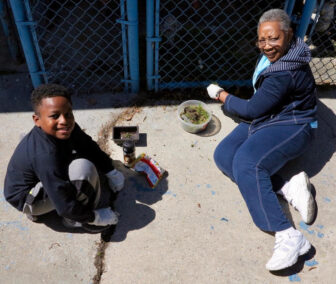How about creating schools with more purpose than test scores and letter grades?
I got my start in education as a Peace Corps volunteer in southeastern Ecuador. I lived and worked in a small rural community. Moya had a tiny school with about 45 students in kindergarten through sixth grade. There was one teacher and two part-time parent volunteers. It was an adobe version of the little red schoolhouse that figures in stories of the American frontier.
During the day, the children studied the basics: reading, writing and arithmetic. But they also had to work, and there was a lot to do: tend the garden, pick up the eggs, milk the cows, look after the school’s sheep and goats, keep the schoolhouse clean and tidy, help prepare breakfast and lunch. Since there was only one teacher, the older students spent time reading with the younger ones.
The students also participated in mingas. A minga is an Andean version of an Amish barn raising. The entire community would come together to tackle large tasks, from repairing irrigation canals to carving out hillside terraces for crop cultivation.
Whenever possible, the teacher tried to incorporate skills and knowledge from the curriculum into the various chores. She asked the kids to estimate the number of ripe cherries on the capulin trees, to describe the behavior of the various animals in their journals, and to divide up ingredients and portions for meals. She always challenged them to come up with the most efficient way to complete each task.
Curriculum tie-ins aside, the chores instilled a sense of responsibility and community. They helped the kids develop discipline, a work ethic, and strong habits of mind. They also nurtured increasingly important workplace skills like collaboration and communication. I noticed that the kids seemed more motivated by chores that had a direct impact on their daily lives.
When I returned to the United States and became a teacher, I tried to incorporate some of the lessons I learned in Ecuador. One of these was to make the learning relevant or purposeful.
It wasn’t easy.
My kids had little interest in the history of Louisiana, let alone the ancient world. (Maybe, I would have had more luck teaching fashion, dating, or contemporary music.) Finding connections to the real world was a challenge in itself — and then there was the need to “cover” a myriad of Common Core topics in impossibly short 50-minute periods.
Nonetheless, I tried.
I had my kids take oral histories from war veterans, write letters to the editor of the local paper, teach “lessons from the past” to younger students, and suggest policy changes to politicians (alas, mostly ignored).

Folwell Dunbar
Parents join their children to participate in school beautification days.
I was working in a private school, so I had some latitude. One time, I took a group of middle- and high-school students to clean up a nearby swamp. There was a recreational area near the highway that was littered with trash. We filled up more than a hundred garbage bags in less than a day.
Most parents embraced the field work, but when we returned to school in the late afternoon, a few met me at the gate to complain. “We don’t pay tuition for our kids to pick up trash in a &%$# swamp,” they griped! “Wouldn’t it be easier to just drain the damn thing?!”
“No,” I said, “draining is actually one of the problems.” I then rattled off a litany of reasons for protecting and preserving fragile wetlands.
“Your kids literally got their feet wet reinforcing lessons learned in the classroom,” I said. “And, they did a good deed.” (The school had experienced a minga moment.)
While my argument to clean up the swamp may have irked a few parents, the confrontation actually strengthened my resolve to make learning more purposeful.
FINDING PURPOSE
Today, whenever I visit a school as an educational consultant, I always ask the kids, “So, what are you learning today?” I immediately Continue reading: How about creating schools with more purpose than test scores and letter grades? | The Lens

